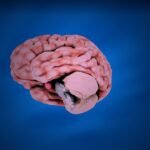
Schizophrenia is a serious mental disorder that can have a major impact on the life of an individual, especially when it begins to manifest itself during childhood.
It is important to be aware of the signs and symptoms associated with schizophrenia in children so that it can be addressed early on, allowing for better outcomes.
This article will discuss these symptoms in more detail and provide information on how to seek help if you suspect your child may have schizophrenia.
What are the warning signs of schizophrenia in children?

There are several warning signs to watch for that may indicate a child is developing schizophrenia. These include:
Delusions & hallucinations
Delusions and hallucinations are two of the most common symptoms of schizophrenia in children.
Delusions are false beliefs that a person holds, despite evidence to the contrary.
Hallucinations involve perceiving something that is not actually there such as hearing voices or seeing things others do not.
Symptoms like this can be difficult for parents to detect as they may seem like normal imagination or fantasy, but if present for a long time and interfere with everyday life, it may be a sign of something more serious.
Difficulty concentrating & disorganized thinking
Children with schizophrenia can have difficulty concentrating and staying focused on tasks or conversations, which can be a sign of disorganized thinking.
They may also jump from one topic to another in conversation or have difficulty following instructions. Additionally, they may express bizarre ideas that seem to lack logic or consistency.
These symptoms can interfere with the child’s ability to function normally in school and social settings.
Social withdrawal & isolation
Social withdrawal and isolation are common among children with schizophrenia.
They may appear to be uninterested in spending time with family or friends, instead opting to spend more time alone or inside their own heads.
Additionally, they may avoid participating in activities that involve social interaction such as attending group sports games or going to the movies.
This is often the result of a child feeling overwhelmed in social situations and unable to cope with their symptoms in public.
Unusual speech patterns
Children with schizophrenia may have unusual speech patterns, such as speaking in a monotone or using overly formal language.
They may also use words or phrases that are not commonly used by those of their age group, and their statements may appear to lack coherence.
Additionally, they may have difficulty understanding the implications of certain words or phrases and/or have difficulty understanding conversations.
This can impact their ability to make and sustain relationships with peers, as well as interact appropriately in social situations.
Changes in behavior & mood swings
Children with schizophrenia may display sudden changes in behavior or mood.
These may include angry outbursts or agitated movements, or they may be more withdrawn and isolated than usual.
Additionally, they may have difficulty expressing emotions or become unusually suspicious or paranoid of those around them.
How do you test a child for schizophrenia?

If you are concerned your child may have schizophrenia, it is important to seek out professional help.
A mental health specialist and/or pediatrician can assess the child and evaluate their symptoms in order to make a diagnosis.
Additionally, they will be able to provide treatment and support for your child that is tailored to their individual needs.
It is also important to provide a supportive and understanding environment at home, as this can help your child cope with their symptoms.
In order to diagnose schizophrenia in children, mental health specialists typically use both physical and psychological tests.
These may include:
- Physical exams to rule out any underlying medical conditions,
- Psychometric testing to measure cognitive functioning
- Brain scans such as an MRI.
Additionally, the specialist may ask questions about a child’s behavior or use psychological questionnaires to assess their level of functioning.
With this information, they can then make an accurate diagnosis and provide the best possible treatment for your child.
How rare is childhood schizophrenia?
Childhood schizophrenia is a rare disorder, with studies suggesting that it affects fewer than 1 in every 2000 children.
It is important to keep in mind that differentiating between childhood psychosis and other mental health conditions can be difficult as they share many of the same symptoms.
Therefore, if you suspect your child may have schizophrenia, it is important to seek help from a mental health specialist.
Final words
Childhood schizophrenia is a rare but serious condition that can have a major impact on the lives of children and their families.
It is important to be aware of the signs and symptoms of this disorder so that you can seek help for your child as soon as possible.
With professional care and support, children with schizophrenia can manage their symptoms and live full, happy lives.


